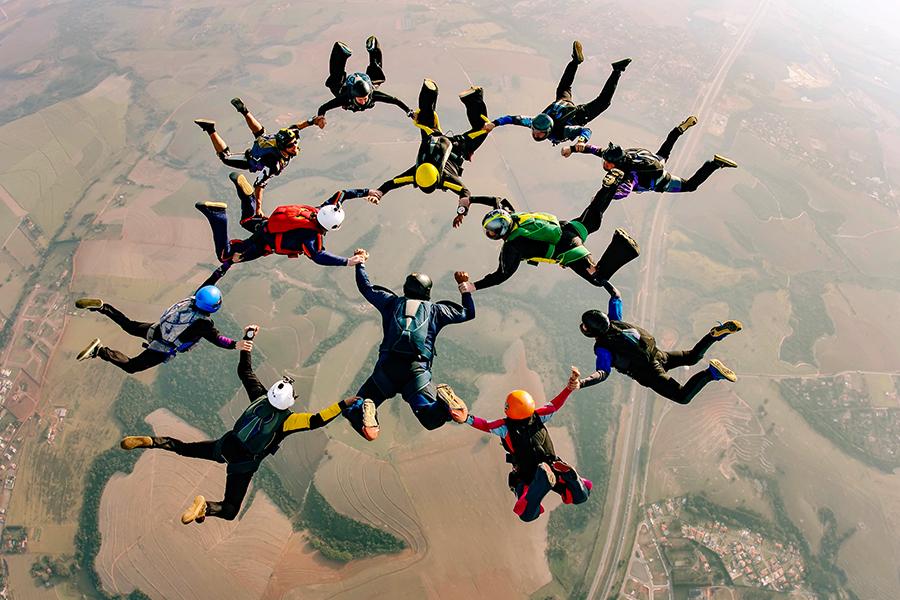What the humble handshake represents in a post-Covid world
While the traditional gesture of shaking hands may not be possible in the current scenario, the meaning behind it still stands strong—a huge responsibility for successful leadership
The simple gesture of shaking hands is believed to have originated as a symbol of good faith, a display of trust and loyalty, signifying a bond and a commitment to doing the right thing. It served as an affirmation of the spirit of reliability and consistency underpinning a relationship. Trusted relationships have long been the foundation of our society, deeply embedded in all its pillars—governments, businesses, society and even our families. Trust, though amorphous in many ways, has been the agent that binds them all together towards holistic success.
History bears witness to the fact that whenever there is a lack of trust in our institutions or our leaders, the system has the potential to break down. In the last few years, owing to fast-paced change, this long-standing relationship with trust has come under question. Deep systemic issues have come to the fore—including climate change, geopolitical concerns, wealth gaps and social tension. Covid-19 proved to be an additional blow, highlighting asymmetry, polarisation, disruption and the impracticality of several businesses. The resulting socio-economic aberrations have evoked different reactions and created misalignment and mistrust between various parts of the ecosystem. With components of the system working at cross purposes, friction has become more apparent, weakening linkages and diluting confidence in the overall system.
This disconnect has, in many ways, spurred the pursuit of self-interest—a drive to achieve more at any cost without consideration for the direct and indirect impact of these unidimensional choices. Profitable growth has taken precedence over sustainable balanced growth, leading to a short-sighted, fractured approach. Therefore, we are witnessing a growing sense of insecurity and scepticism.
A society or an organisation coping with a trust deficit is further burdened with the challenge of mounting anxiety—possibly creating a potential risk of over-governance and rising complexities. This is where the importance of restoring trust comes in. It has never been more crucial, nor more challenging to achieve. Moving forward requires a whole-of-society approach, and alignment between governments, organisations and society as they take on tomorrow.
Trust is a key value enabler, and there is a need to give as much consideration to the expectations of all stakeholders as it is to those of the shareholders—both of whom are equally important levers for any institution to exist. The wider ecosystem is evolving and it is incumbent upon governments and organisations to play a more active and purposeful role in our society to address the paradox of declining trust and growing expectations. At this inflection point, success is heavily dependent on driving meaningful change. There is an essential need to create fundamental shifts in aspirations, culture and systems, and to encourage a growth mindset with conscious action. A good starting point in this transformation journey is looking inwards and building internal trust. Open and authentic leadership will play a huge role in cultivating this much-needed value-driven culture with a shared purpose, around four key questions:
- What are we doing?
- Why are we doing it?
- How will we deliver on it?
- Who is impacted by our choices?
The willingness to do the right thing at the right time, in the most environmentally, ethically and socially viable manner should come from within. Proactively investing in nurturing this kind of environment would create a cohort of brand ambassadors that will in turn feed external trust.
In a world that is increasingly becoming human-led and tech-powered, trust will possibly be one of the biggest competitive differentiators. The front-runners are the ones that have responded to this call to action—they have established at-scale relationships with all their stakeholders and built robust systems to drive a sense of credibility and accountability.
Forward-thinking companies have considered how they can deliver on trust in a sustained manner—be it assessing the importance of data management and privacy, gaining a wider perspective through more inclusive workforces, preparing for disruptions by building resilient supply chains, taking into account environmental and societal implications, or putting in place robust governance and reporting frameworks. These companies are leading the change and have tailored their choices in line with the possible consequences of their actions.
Leaders that rise to this new level of all-encompassing thinking will be able to deliver sustained outcomes to their stakeholders, fuelled by trust. Trust may be amorphous but the value it creates for our organisations and society at large is enormous, and it is a key driver for delivering on stakeholder expectations in a sustained manner.
While the traditional gesture of shaking hands may not be possible in the current scenario, the representation behind it still stands strong—a huge responsibility and an imperative for success.
The author is Chairman of PwC India.
The thoughts and opinions shared here are of the author.
Check out our end of season subscription discounts with a Moneycontrol pro subscription absolutely free. Use code EOSO2021. Click here for details.

